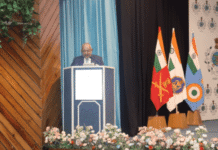Ashish Shelar meets A&N Chief Secretary; seeks centre’s support for national tribute
Sri Vijaya Puram (Port Blair), 16 May 2025 – Maharashtra’s Minister of Cultural Affairs and Information Technology, Adv. Ashish Shelar, has proposed the establishment of a national memorial dedicated to freedom fighter Vinayak Damodar Savarkar at the Cellular Jail in Andaman. The proposal was formally discussed in a meeting on Friday with Dr. Chandra Bhushan Kumar, Chief Secretary of the Andaman and Nicobar Administration.
According to a statement issued by the office of Ashish Shelar, the minister has also submitted a letter to Union Home Minister Amit Shah, seeking central government support and requisite approvals for the project.
The statement noted that the proposed memorial would include a statue of Savarkar, sculptural panels, a digital museum, and an interpretation centre designed to present the contributions of Savarkar and other freedom fighters incarcerated at the Cellular Jail during British rule.
“The Cellular Jail, once a site of immense sacrifice, must now stand as a national space of remembrance,” the statement said. It added that Maharashtra is committed to seeing the project through, with the support of both the Central Government and the local administration.
The concept and design of the memorial are being developed under the guidance of Vikas Kharge, Additional Chief Secretary to the Chief Minister and Additional Chief Secretary of the Department of Cultural Affairs.
Vinayak Damodar Savarkar, an Indian political activist and writer associated with the early revolutionary movement against British colonial rule, was imprisoned at the Cellular Jail in Port Blair, Andaman and Nicobar Islands, from 1911 to 1921. He was sentenced to two life terms of transportation—totaling 50 years—in connection with revolutionary activities, including the circulation of nationalist literature and his alleged involvement in a conspiracy linked to the assassination of British official A.M.T. Jackson.
At the Cellular Jail, also known as Kala Pani, Savarkar was kept in solitary confinement and subjected to rigorous physical labour, including tasks like oil pressing. The penal colony was known for its harsh conditions, limited communication, and minimal access to legal recourse.
During his imprisonment, Savarkar is reported to have written extensively, including poetry and political reflections, some of which were memorized or inscribed using improvised tools due to lack of writing materials. He submitted multiple petitions for clemency to the British authorities, the contents and intent of which have been subject to varying interpretations by historians.
Savarkar was released from the Andamans in 1921 and later transferred to Ratnagiri jail. His time at the Cellular Jail remains a significant, though debated, part of India’s freedom struggle history.





